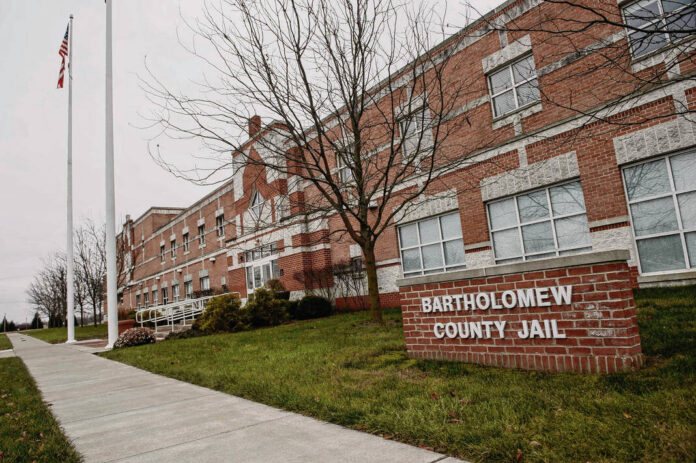Law enforcement agencies in Bartholomew County are facing challenges in retaining and recruiting officers driven by a confluence of factors, including “national and local rhetoric about law enforcement” following several high-profile police killings in recent years.
Earlier this week, the Bartholomew County Sheriff’s Department and Columbus Police Department had a collective 18 openings for officers — amounting to about 8% of their combined workforce. And that is even with CPD hiring four officers earlier this month.
Local officials said the high number of vacancies reflects a nationwide trend as law enforcement agencies across the country contend with increases in retirements and resignations, as well as stress and burnout during the pandemic and the national reckoning over police-involved deaths.
A survey of around 200 police departments found that retirements increased 45% and resignations rose 18% from April 2020 and April 2021, compared to the year before, according to the Police Executive Research Forum, an independent policy organization based in Washington, D.C.
At the same time, public attitudes on policing have changed, according to recent polls. Last year, as many as half of American adults believed police violence against the public was a “very” or “extremely” serious problem, according to one poll conducted by The Associated Press-NORC Center for Public Affairs Research.
“Law enforcement across the country has really been hit hard in the last few years,” said Bartholomew County Chief Deputy Maj. Chris Lane. “Some of that is because of incidents that were brought on by other law enforcement officers from around the country that did things that they shouldn’t have done.”
Shuffling staff around
As of Wednesday, the Bartholomew County Sheriff’s Department had 14 openings, including nine openings for corrections officers, Lane said. An additional seven officers were out due to injuries, medical issues or still in training at the state law enforcement academy.
Even if the sheriff’s office filled every opening today, it would be mid-April before they would be working on their own in the field, as the law enforcement academy is about 16 weeks and then field training can last three to four months.
“So, you’re looking at, in essence, about eight months,” Lane said. “Even though I’ve got the position filled, there will be eight months of essential training before that person’s cut loose on their own — and that’s if everything goes as planned.”
And the sheriff’s department has already had to shuffle employees around — including clerical and maintenance staff — to help prepare meals for inmates at the Bartholomew County Jail due to a shortage of kitchen staff.
As of Thursday morning, there were 254 inmates at the jail — each one getting three meals per day. That comes out to a total of 762 meals that staff need to prepare and distribute every day.
“We can’t say, ‘Well, we’re not serving dinner tonight,’” Lane said. “That’s not an option. We have to. We can’t lock the doors to the building. We can’t go out and say, ‘Hey, we’re not taking more inmates.’ That doesn’t work. Our doors are always open, and we just have to move people around to backfill in certain areas.”
“If we continue to go down the road, and we get lower and lower staffing, if I have to move people, do I have to take a deputy off the street to have them go back and help in the jail?” Lane added. “Do I have to take a deputy off the street to go help at the courthouse so that courthouse guy or gal can come over here and help in the jail?”
National trend
But local law enforcement agencies aren’t the only ones who are facing challenges in retaining and recruiting officers.
Last year, law enforcement agencies across the country reported experiencing a wave of retirements and departures and were struggling to recruit the next generation of police officers in the year since George Floyd was killed by an officer, according to The Associated Press.
Floyd was killed in May 2020 by former Minneapolis police officer Derek Chauvin, who pressed his knee on Floyd’s neck while Floyd was handcuffed behind his back, according to wire reports.
The killing sparked nationwide protests amid a national reckoning on police violence and racism. Chauvin was convicted of murder and sentenced to 22 and a half years in prison.
It’s also a dangerous job for officers. Less than a month ago, a police officer was killed in Elwood, Indiana, when a man got out of his car during a traffic stop and opened fire, according to wire reports.
However, law enforcement agencies were already experiencing challenges in attracting and retaining officers before Floyd’s murder, according to a 2019 survey by the International Association of Chiefs of Police.
“The difficulty in recruiting law enforcement officers and employees is not due to one particular cause,” the International Association of Chiefs of Police said in a report presenting the survey’s results. “Rather, multiple social, political and economic forces are all simultaneously at play in shaping the current state of recruitment and retention. They are both systemic in nature and reflect individual-level considerations, making solutions to the problem particularly challenging.”
Smaller applicant pool
At the same time, fewer people are applying to be police officers — and local officials say they’re lucky if those who do apply actually show up for their interviews.
CPD has seen a dramatic decrease in the number of applicants for patrol officers over the past couple decades, said department spokesman Lt. Matt Harris.
In the early 2000s, it was fairly common to have more than 300 applicants vying for five or six vacancies at CPD, Harris said. During the most recent hiring process, CPD received about 30 applications for eight spots.
“And obviously, when we go through the subsequent steps of the testing process, whether it be the written test, the physical test, the background test, those numbers dwindle rapidly,” Harris said, adding that the department won’t lower its standards just to fill vacancies.
CPD had four openings for patrol officers as of Thursday, though just a few weeks ago the department had eight vacancies, officials said.
The Bartholomew County Sheriff’s Department has been holding interviews for corrections officers for more than a month, though only “a very small amount (of applicants) show up,” Lane said.
This past Monday, for example, the sheriff’s department had nine interviews scheduled for corrections officers, but only two people showed up.
Harris said CPD had started noticing that more people were reconsidering whether they wanted to pursue careers in law enforcement following the killing of Michael Brown in Ferguson, Missouri in 2014, as well as other “high-profile controversies in law enforcement.”
In the past, CPD had seen people in other professions — including engineers and school teachers — switch careers to become law enforcement officers, Harris said. However, that is not as common as it used to be.
“You just don’t see that as much now,” Harris said. “It’s either someone comes out of the military and puts in an application or they go through college and major in criminal justice.”
Both departments say they have taken steps in recent years to try to woo recruits to join their ranks and motivate people to stay.
CPD started allowing officers who live in Bartholomew County or a neighboring county to have take-home vehicles. In addition, the department has raised pay and now allow officers to have facial hair and visible tattoos, except on the face, hands and neck.
The sheriff’s department is requesting a 5% increase in salaries for next year, Lane said, adding that the department is doing its “due diligence to do everything we can” to attract quality applicants.
Starting pay for a CPD officer is about $55,60o to $66,725 this year, while Bartholomew County Sheriff’s deputies’ base salary is just over $56,400 and corrections officers’ salaries are just shy of $43,130.
“It’s extremely challenging (to recruit),” Harris said. “But we have to use our due diligence to make sure we’re putting the right people in patrol cars here in Columbus and not just hiring anyone who thinks that, ‘I want to be an officer.’”





